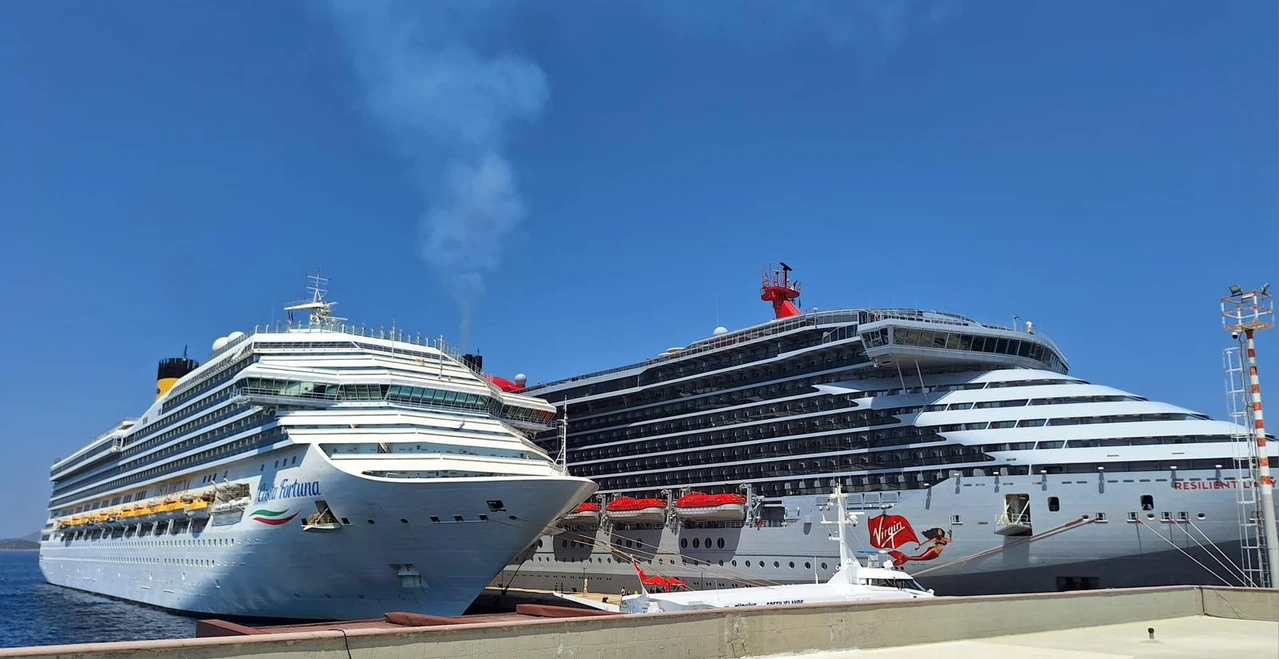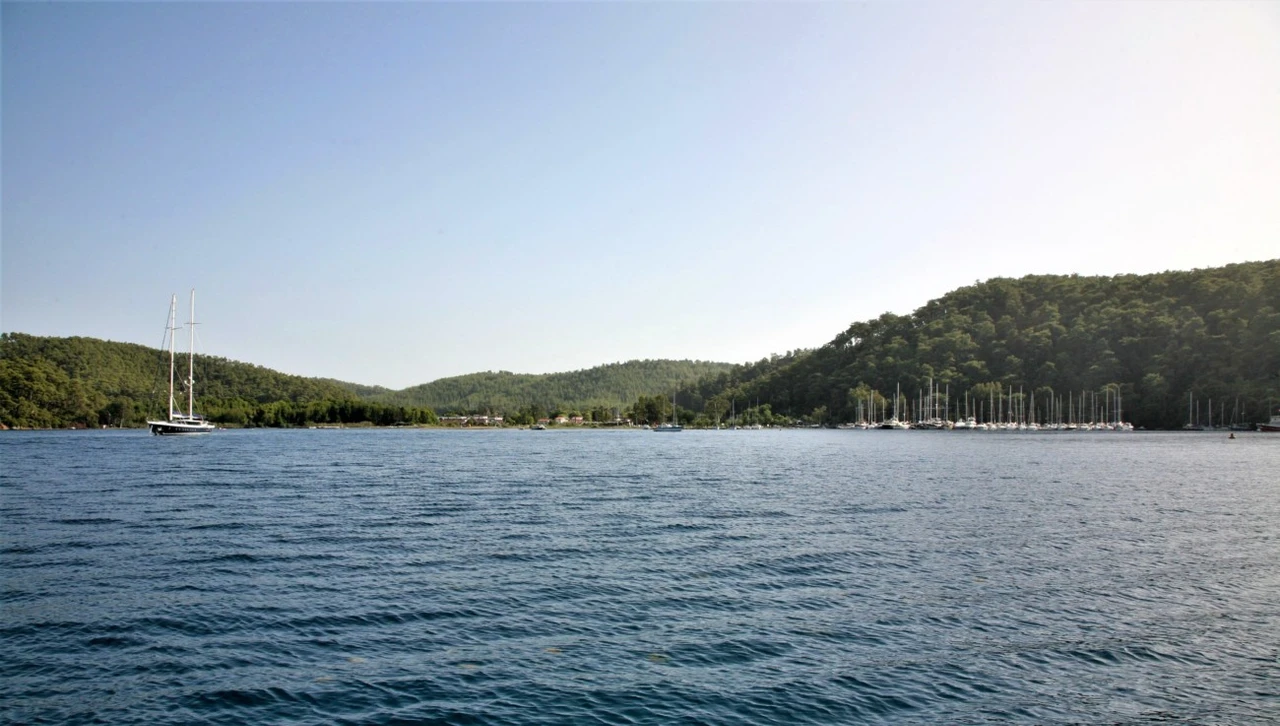Turkish tourism industry faces setback as tourists flock to Greek islands
 Costa Fortuna and Resilient Lady cruise ships docked at Bodrum, Türkiye on June 6, 2024 (Anadolu Images)
Costa Fortuna and Resilient Lady cruise ships docked at Bodrum, Türkiye on June 6, 2024 (Anadolu Images)
The Turkish tourism industry in the Aegean region is facing a challenging season as high prices and economic conditions drive tourists to seek more affordable alternatives, such as the Greek islands.
Popular holiday destinations like Bodrum, Cesme and Datca are witnessing a significant decline in activity compared to previous years, with many tourists opting for the Greek islands instead.
Business owners in these areas dispute claims that the Greek islands are cheaper, highlighting the differences in service quality. Yakup Demir, President of the Cesme Hoteliers Association (CESTOB), emphasized these differences, stating, “People can choose to go to the islands or stay here. “
“However, it should not be forgotten that there are some differences in terms of service here.”
He pointed out that accommodations on the Greek islands are often older and less luxurious, adding: “Most of the houses and hotels there are old, with small renovations done. There are no 4-5 star places.”
What are quality, service concerns in Greek islands?
Demir noted that the hospitality industry on the Greek islands is largely family-run and lacks the professional staff found in Turkish resorts. “Most hotels and restaurants are modest, family-run, with no extra staff. If Turkish hoteliers did the same and there was the slightest issue with service or cleanliness, our tourists would complain a thousand times,” he said.
Despite this, Turkish tourists appear satisfied with the simpler offerings of the Greek islands, particularly enjoying the free beaches. “Yet, they are happy there despite the clear difference in quality. But they do one thing very well: beaches are free!” he added.
Comparing costs of Türkiye, Greece as tourist destination
Murat Akbal, Chairman of the Board of Akbaldan Tourism, argued that the Greek islands are not a direct substitute for Turkish coastal resorts. “In economics, there is something called ‘substitution,’ replacing something with another of equal value,” Akbal explained.
He frequently visits Rhodes, Symi, and Lesbos for business, noting: “Although the Greek islands are beautiful and valuable in their own right, they are not comparable to Türkiye’s coasts because our substitute is not the Greek islands.”
Akbal discussed the disparity in costs between Turkish and Greek resorts, using Marmaris and Rhodes as examples. “For a three-night stay with breakfast in a five-star hotel in Marmaris, it’s $1,360 (TL 45,000), while in Rhodes, it’s $1,960 (TL 64,750),” he said.
He emphasized the operational costs faced by Turkish businesses, including rent, employees, insurance, and taxes, which contribute to the higher prices.
“People go to the Greek islands because it’s trendy. Otherwise, the difference in quality and service is significant.”
Impact on local tourism in Bodrum, Cesme and Datca
Business owners and hoteliers in Bodrum, one of Türkiye’s most famous holiday resorts, are longing for the bustling days of the past. Entry fees to beaches, prices at nightclubs, and restaurant costs have seen significant increases.
To enter a mid-range beach, one needs to pay between $120 and $150, while at high-end beaches, this amount can rise to $240 to $300. Similarly, restaurant prices have soared. For instance, a lahmacun starts at $9 and can go up to $28.50 in luxury venues. These high costs are driving both local and foreign tourists away from Bodrum.
The situation in Cesme and Datca mirrors Bodrum’s. In Cesme, beach entry fees and restaurant prices are also high, while in Datca, the increase in accommodation and food prices is putting tourists in a difficult position.
High costs in these popular destinations have led Turkish tourists to seek more affordable holiday options, with the Greek islands emerging as a preferred alternative.
Public beaches, government responses
Local public beaches and alternatives managed by local governments and the Ministry of Culture and Tourism remain available, though their free entry is overshadowed by high accommodation and food costs. Demand for public beaches continues to be significant even in expensive holiday resorts.
Minister of Culture and Tourism Mehmet Nuri Ersoy attributed the decrease in tourist numbers in holiday resorts to Euro 2024. He mentioned that 10,000 people went abroad to watch the matches, and these individuals were potential customers for the Aegean Region. Ersoy predicts a resurgence in visitors to the coasts after the championship.
Reactions from business owners
Business owners in Bodrum and Cesme have expressed their dissatisfaction with Turkish citizens choosing Greek islands over local holiday spots because of the high costs.
They pointed to several issues: concerts in open-air venues with a capacity of 5,000 people are being canceled because of insufficient ticket sales, nightclubs, and live music venues are closing early because of a lack of customers, and some hotels have started laying off workers.
Customers in Alacati, Cesme, are opting for Greek islands and other holiday regions. Business owners argue their prices are not excessively high but reasonable given the current economic conditions.
Adapting to changing tourist preferences
The high prices in Türkiye’s Aegean region have driven tourists to seek more affordable alternatives, notably the Greek islands.
Despite the differences in service and quality, the allure of lower costs and trendy destinations has shifted the flow of tourists away from Bodrum, Cesme and Datca, leaving local businesses to adapt to the changing dynamics of the tourism market.



